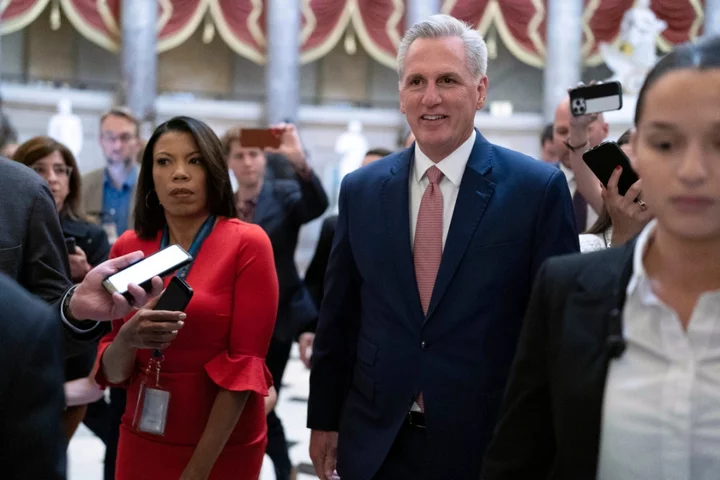
Ahead of House debt ceiling vote, Biden shores up Democrats and McCarthy scrambles for GOP support
Hard-fought to the end, the debt ceiling and budget cuts package is heading toward a crucial U.S. House vote as President Joe Biden and Speaker Kevin McCarthy assemble a coalition of centrist Democrats and Republicans to push it to passage over fierce blowback from conservatives and some progressive dissent. Biden is sending top White House officials to meet early Wednesday at the Capitol to shore up support ahead of voting. McCarthy is working furiously to sell skeptical fellow Republicans, even fending off challenges to his leadership, in the rush to avert a potentially disastrous U.S. default. Despite deep disappointment from right-flank Republicans that the compromise falls short of the spending cuts they demanded, McCarthy insisted he would have the votes needed to ensure approval. “We’re going to pass the bill,” McCarthy said as he exited a lengthy late Tuesday night meeting at the Capitol. Quick approval by the House and later in the week the Senate would ensure government checks will continue to go out to Social Security recipients, veterans and others, and prevent financial upheaval at home and abroad. Next Monday is when Treasury has said the U.S. would run short of money to pay its debts, risking an economically dangerous default. The package leaves few lawmakers fully satisfied, but Biden and McCarthy are counting on pulling majority support from the political center, a rarity in divided Washington, testing the leadership of the president and the Republican speaker. Overall, the 99-page bill restricts spending for the next two years, suspends the debt ceiling into January 2025 and changes policies, including new work requirements for older Americans receiving food aid and greenlighting a controversial Appalachian natural gas line that many Democrats oppose. For more than two hours late Tuesday as aides wheeled in pizza at the Capitol, McCarthy walked Republicans through the details, fielded questions and encouraged them not to lose sight of the bill’s budget savings. The speaker faced a sometimes tough crowd. Leaders of the hard-right House Freedom Caucus spent the day lambasting the compromise as falling well short of the spending cuts they demand, and they vowed to try to halt passage by Congress. “This deal fails, fails completely," Rep. Scott Perry, R-Pa., the chairman of the Freedom Caucus, said earlier in the day, flanked by others outside the Capitol. “We will do everything in our power to stop it.” A much larger conservative faction, the Republican Study Committee, declined to take a position. Even rank-and-file centrist conservatives were not sure, leaving McCarthy desperately hunting for votes. Rep. Nancy Mace, R-S.C., said after the “healthy debate” late into the night she was still a no. Ominously, the conservatives warned of potentially trying to oust McCarthy over the compromise. “There’s going to be a reckoning,” said Rep. Chip Roy of Texas. Biden was speaking directly to lawmakers, making more than 100 one-on-one calls, the White House said. The nonpartisan Congressional Budget Office said the spending restrictions in the package would reduce deficits by $1.5 trillion over the decade, a top goal for the Republicans trying to curb the debt load. McCarthy told lawmakers that number was higher if the two-year spending caps were extended, which is no guarantee. But in a surprise that could further erode Republican support, the GOP's drive to impose work requirements on older Americans receiving food stamps ends up boosting spending by $2.1 billion over the time period. That's because the final deal exempted veterans and homeless people, expanding the food stamp rolls by some 78,000 people monthly, the CBO said. House Democratic leader Hakeem Jeffries said it was up to McCarthy to turn out votes from some two-thirds of the Republican majority, a high bar the speaker may not be able to reach. Some 218 votes are needed for passage in the 435-member House. Still, Jeffries said the Democrats would do their part to avoid failure. “It is my expectation that House Republicans would keep their promise and deliver at least 150 votes as it relates to an agreement that they themselves negotiated,” Jeffries said. “Democrats will make sure that the country does not default.” Liberal Democrats decried the new work requirements for older Americans, those 50-54, in the food aid program. And some Democratic lawmakers were leading an effort to remove the surprise provision for the Mountain Valley Pipeline natural gas project. The energy development is important to Sen. Joe Manchin, D-W.Va., but many others oppose it as unhelpful in fighting climate change. The top Democrat on the House Natural Resources Committee, Rep. Raul Grijalva of Arizona, said including the pipeline provision was “disturbing and profoundly disappointing.” Rep. Pramila Jayapal, D-Wash., chair of the Congressional Progressive Caucus, had this warning for McCarthy: “He got us here, and it’s on him to deliver the votes." Wall Street was taking a wait-and-see approach. Stock prices were mixed in Tuesday's trading. U.S. markets had been closed when the deal was struck over the weekend. The House aims to vote Wednesday and send the bill to the Senate, where Democratic Majority Leader Chuck Schumer and Senate Republican leader McConnell are working for passage by week's end. Schumer called the bill a “sensible compromise.” McConnell said McCarthy “deserves our thanks.” Senators, who have remained largely on the sidelines during much of the negotiations between the president and the House speaker, began inserting themselves more forcefully into the debate. Some senators are insisting on amendments to reshape the package from both the left and right flanks. But making any changes to the package at this stage seemed unlikely with so little time to spare before Monday's deadline. ___ Associated Press writers Farnoush Amiri, Mary Clare Jalonick and Seung Min Kim contributed to this report. Read More Ukraine war’s heaviest fight rages in east - follow live Charity boss speaks out over ‘traumatic’ encounter with royal aide Changes to food aid in debt bill would cost money, far from savings GOP envisioned GOP chairman moves to hold FBI director Wray in contempt over Biden doc Debt limit agreement clears first hurdle. Here’s what happens next
2023-05-31 12:53
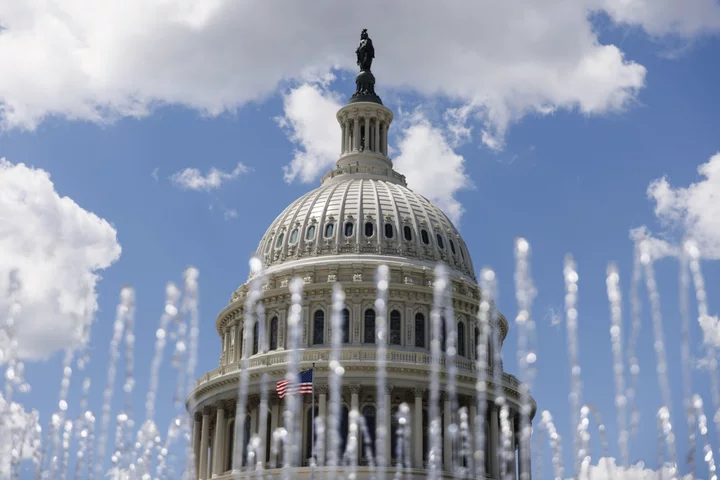
Debt-Limit Deal Heads to House Vote After Clearing Key Hurdle
The debt-limit deal struck by President Joe Biden and Speaker Kevin McCarthy is heading toward a vote Wednesday
2023-05-31 12:48

World’s Top Coal Miner Hikes Prices as Wage Bill Surges
Coal India Ltd., the world’s biggest miner of the fuel, raised prices for the first time in five
2023-05-31 12:25

Culture wars, parenting and tiptoeing around Trump: Five takeaways from Ron DeSantis’s 2024 launch
Ron DeSantis is officially running for president, and on Tuesday landed in the early caucus state of Iowa to give voters a preview of what his campaign will look like. What that shaped up to be in Des Moines was largely what analysts had expected for months: a bid for higher office that leans into Republican culture war battles and as far away from direct confrontation with the incumbent de facto leader of the party, Donald Trump. Mr DeSantis spoke to an enthusiastic crowd that cheered enthusiastically at his vows to score major wins on those issues like LGBT+ rights and “critical race theory”, but less for his veiled shots at the former president, who was never mentioned by name for obvious fear of losing the audience. The governor instead heaped his criticism on Joe Biden and the administrative state which he hinted that Mr Trump had failed to rein in. He was joined by his wife, Casey, and a handful of state-level elected officials — a preview of the battle that is no doubt shaping up in the state where the governor will have his first (and potentially only) real chance to prove that he can credibly compete with the former president, who has turned his fire wholly on his top rival in recent weeks amid continued polling showing the governor falling further behind him. Here are five things you should remember about Tuesday night’s rally going forward into the 2024 primary season: 1. DeSantis was backed by powerful state officials In a clear coup for the DeSantis campaign, the Florida governor charged into his rally on Tuesday backed by both Iowa’s governor and lieutenant governor, Kim Reynolds and and Adam Gregg respectively. To be clear: in a pre-Trump political world, this would be a massive advantage for any candidate to have. Winning the endorsements of the two highest-level officials in state government, let alone at one’s launch rally, is a sign of political dominance that would make any candidate other than Donald Trump think twice about even competing in the state. But Mr Trump is no ordinary opponent, and his continued star power in the GOP far outstrips that of any GOP statewide official — even at home. The former president’s endorsement hasn’t proven to be ironclad, seeing key defeats to opponents of Mr Trump on various sides of the political spectrum in 2022, but it’s fair to say that Mr Trump remains a credible competitor, even perhaps the frontrunner, to win in Iowa regardless of Ms Reynolds and Mr Gregg’s endorsements. 2. The governor won’t touch Trump Mr DeSantis was more than eager to turn his sights on Joe Biden and the actions of his administration during the speech. Not so much for Mr Trump, who was not mentioned by name at all in the governor’s remarks. The desire of Mr DeSantis to avoid a confrontation with the former president might be more convincing, however, had he not indirectly referenced Mr Trump multiple times during his remarks — including at one moment when he asserted that four years in office was simply insufficient to rein in America’s bureaucracy. Even George Washington, the governor charged, would be unable to do so in that amount of time. Mr DeSantis’s tone notably changed when speaking to reporters after the event ended — “He used to say how great Florida was... Hell, his whole family moved to Florida under my governorship,” he noted of the former president. But that fire has yet to emerge in front of those who actually decide elections: voters. The governor therefore appears to be largely stuck in limbo; unwilling or unable to land a blow against Mr Trump when it counts, but more than cognisant of his need to do so. 3. Culture wars rise to the top The greatest targets for criticism on Tuesday were not Mr Biden or his team in the White House at all. Mr DeSantis reserved his harshest tone for so-called “woke” ideologies such as support for LGBT+ rights among public officials and private businesses. He vowed to purge any teachings he deemed remotely “inappropriate” for children from schools, and pledged to do the same to the military and other federal agencies if elected president. This is Mr DeSantis’s true strategy: master the issues that make GOP voters the angriest, and bet that it will propel him not just through a primary race against Donald Trump but to the White House against Joe Biden as well. The governor argued that keeping the attention on these issues and presenting a “positive” alternative to Mr Biden’s vision for America would be their ticket to a victory. 4. Pressure against Republicans on the debt ceiling After Donald Trump came out and said that Republicans in Congress should “do a default” unless they score significant concessions from Democrats in legislation to raise the debt ceiling this week, Mr DeSantis upped the ante further and declared on Tuesday that Republicans should oppose the idea entirely. He railed at the idea of raising America’s debt ceiling by $4 trillion and warned that the GOP’s existing cuts to spending secured in a Saturday-night deal between Joe Biden and Speaker Kevin McCarthy were not enough — America would still be spiralling towards bankruptcy, he asserted. Expect that to raise the stakes for hardline conservatives in Washington this week as Mr McCarthy hopes to whip as many votes as possible in his caucus to support the bill aimed at averting a default on the US’s loans. 5. Leaning on parents in the battle for suburbia One last interesting theme that Mr DeSantis’s rally touched on multiple times was the idea of families and parents having sovereignty over their kids, their local schools, and other entities. It was hardly a surprising point for the Florida governor to tout, given his signing into law several bills affecting the teachings allowed in schools in the Sunshine State which have been decried by the NAACP and other organisations. But it also played into another larger dynamic that has been playing out across the country for several years. The governor’s repeated statements of support for parents and his efforts to draw support from conservative-aligned education activists are part of the greater GOP’s response to a trend that quickened sharply under Donald Trump’s presidency: the blue-ing of America’s suburbs, which have trended steadily Democratic in recent years while the party simultaneously lost its grip on blue collar voters in the Rust Belt and other areas. His strategy mirrors the one pursued by Virginia’s Glenn Youngkin in 2021, which led to Mr Youngkin beating out former Gov Terry McCaulife and becoming the first Republican to win a statewide election in that purple state since 2009. Read More DeSantis hits familiar targets of Fauci, Disney and ‘wokeism’ in first rally as 2024 candidate Ron DeSantis called out for ‘ignoring’ Hollywood beach shooting: ‘He doesn’t care’ LGBTQ people are fleeing Florida in ‘mass migration’ with some fundraising via GoFundMe Ivanka and Jared split over attending Trump 2024 launch – follow live Why was Donald Trump impeached twice during his first term? Four big lies Trump told during his 2024 presidential announcement
2023-05-31 11:50

China Is Drilling a 10,000-Meter Deep Hole Into Earth’s Crust
Chinese scientists have begun drilling a 10,000-meter (32,808 feet) hole into the Earth’s crust, as the world’s second
2023-05-31 11:46

North Korea Warns of New Launch ‘Soon’ After Satellite Failure
North Korea confirmed that its effort to launch a military spy satellite into orbit failed, and said it
2023-05-31 11:27
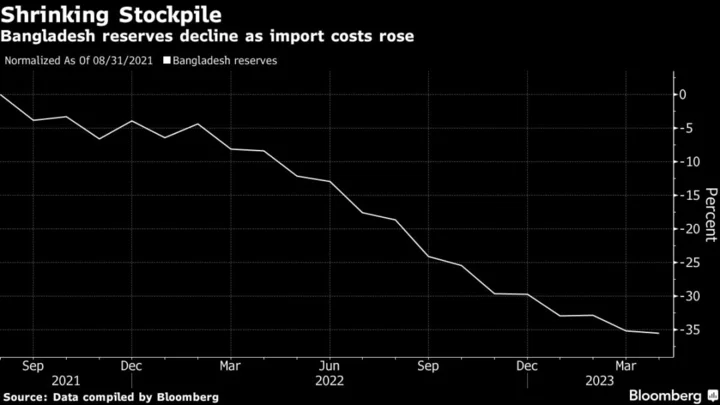
Moody’s Cuts Bangladesh Rating on Reserves, Market Distortions
Moody’s Investors Service lowered Bangladesh’s credit rating as the nation’s foreign-exchange reserves dwindle while unconventional policies such as
2023-05-31 10:48
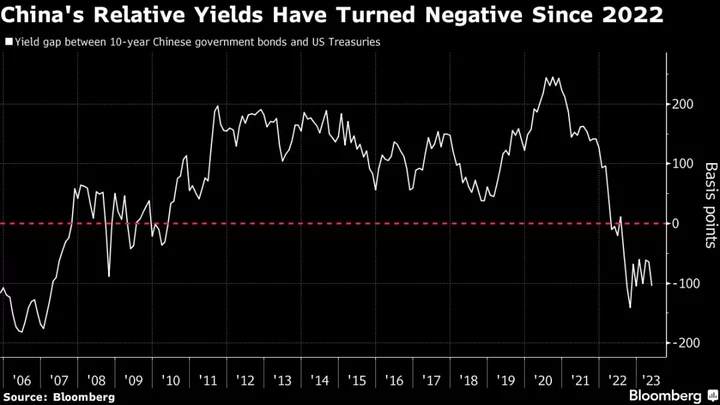
Veteran Trader Sees China Assets Hobbled for Three More Years
Global investors will avoid China assets for another three years as the nation keeps its interest rates low
2023-05-31 10:30

China Leads the World in Preparing for Extreme Weather Threats to Power Supplies
It’s not even June, and China is fielding sweltering temperatures in Shanghai, and peak power demand from Guangdong
2023-05-31 10:27

Chinese Stocks Extend Rout as Factory Gauge Contracts Again
A key gauge of Chinese stocks was again poised to enter a bear market after flirting with the
2023-05-31 10:25

JPMorgan Says China Growth Takes Longer, Eyes Japan Market
JPMorgan Chase & Co. said the bank’s China expansion is taking longer than expected, as it gears up
2023-05-31 10:17
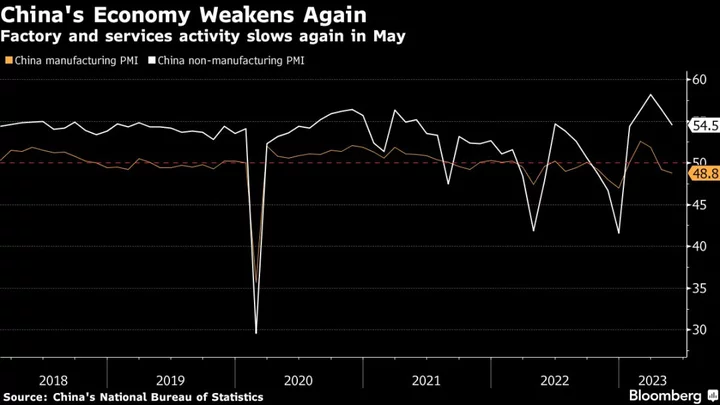
China’s Factory Slump Worsens in Sign of Weak Economic Recovery
China’s manufacturing activity contracted for a second straight month in May, providing more evidence the post-Covid recovery in
2023-05-31 09:55
